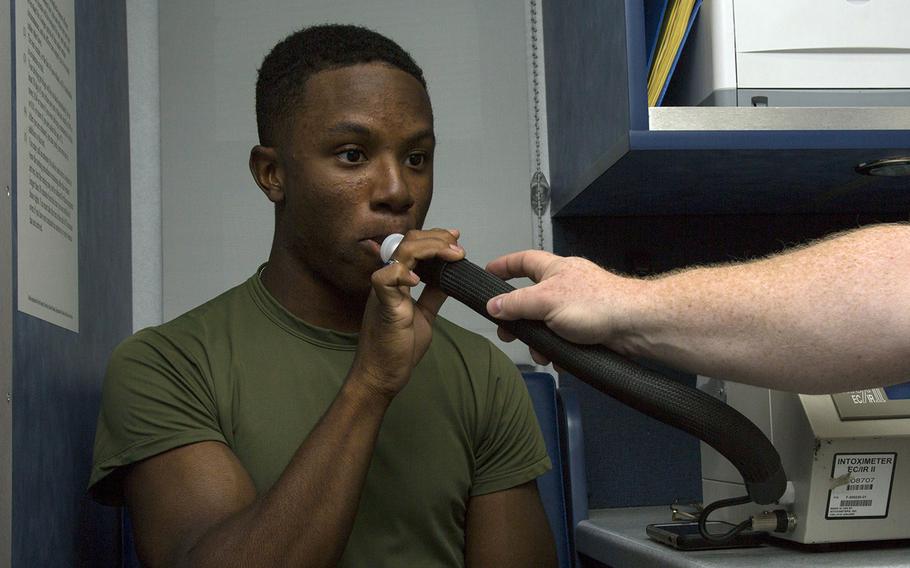
A lance corporal takes a Breathalyzer test at Camp Lejeune, N.C., Sept. 29, 2017. (Colton Brownlee/U.S. Marine Corps)
The Marine Corps is reviving random Breathalyzer and urinalysis testing across the force following a temporary pause brought on by the COVID-19 pandemic.
The Alcohol Screening Program, which requires 10% of Marines in each unit to take a Breathalyzer and undergo urinalysis every month, will resume no later than June 1, Lt. Gen. James Glynn, deputy commandant for manpower and Reserve affairs, wrote in a Marine Corps administrative message Monday.
The screening program was suspended while the COVID-19 public health emergency — declared by the federal government in January 2020 — was in effect because a Breathalyzer test requires a subject to blow into the device, according to the message. COVID-19 is transmitted through tiny liquid particles from an infected person’s mouth or nose, according to the World Health Organization.
The Department of Health and Human Services ended the COVID-19 public health emergency on Thursday, a plan it announced in February.
The screening program “supports a commander’s efforts to ensure Marines arrive to work safely and fit for duty,” the Marine Corps message states. The policy applies to active-duty Marines, members of the Selected Marine Corps Reserve and Marines on active operational support orders.
Alcohol abuse has long been a problem in the Marine Corps and is sometimes glorified as part of its culture. A 2018 Defense Department health behaviors survey by the Rand Corp. found that 45% of Marine respondents reported binge drinking in the past 30 days, the highest rate reported by any service branch.
The secretary of the Navy established the screening program in January 2013. Testing began semi-annually to identify at-risk service members and refer them for training, counseling or treatment.
Although the program was designed for deterrence and education, commanders were afforded leeway to pursue administrative action against offenders. Marines found to be in violation face a range of interventions from counseling to court-martial.
The policy directs leaders to counsel Marines whose tests showed a blood-alcohol content of 0.01% or greater and refer those with 0.04% or greater to military medical practitioners to determine their fitness for duty.
A service member incapacitated by drunkenness or with a blood-alcohol content of 0.08% while on duty is committing a criminal offense under the Uniform Code of Military Justice.
Offenders face punishments ranging from a bad conduct discharge, forfeiture of pay and allowances and confinement of anywhere from a couple of months to years depending on one’s job and the severity of the offense, the UCMJ states.
Daniel Conway, a former Marine officer and Washington-based attorney who specializes in representing service members, said he doesn’t believe the program will lead to an influx of fresh courts-martial. At the same time, he sees potential issues.
“Part of the problem is they’re testing a really low percentage and they’re doing so randomly and they’re using a tool that can be unreliable,” he told Stars and Stripes by phone Thursday. “If the intent of the program is to help identify Marines who need substance abuse counseling, I think there’s far better ways for leaders to get to know their Marines and make that determination.”